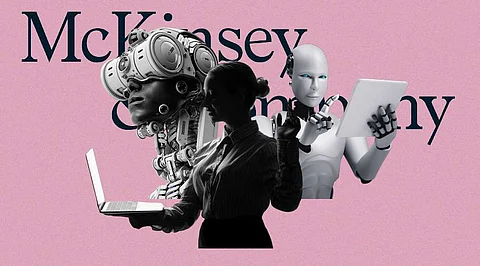

According to a recent analysis, advances in artificial intelligence (AI) technology may change the U.S. workforce by the end of the decade as corporations progressively use AI technologies to help automate chores that take roughly one-third of Americans' workweeks.
The McKinsey Global Institute issued a paper on "Generative AI and the Future of Work in America" on Wednesday, finding that developments in AI technology have the potential to accelerate economic automation.
"Our research estimated that without generative AI, automation could take over tasks accounting for 21.5% of the hours worked in the US economy by 2030," according to the paper. "With it, that share has now jumped to 29.5%."
The McKinsey analysis listed several professions as being well-positioned to see a higher percentage of automated work hours thanks to AI.
The faster deployment of AI would result in a 16-point increase in the percentage of automated work hours for professionals in STEM subjects, reaching 30% by 2030.
Professionals in education and workforce training would also receive a 16% gain, even though these areas had lower automation baselines before AI acceleration. Therefore, only roughly 23% of those professionals' working hours in 2030 will be led by AI.
Along with business and legal professionals, who would see a 14-point increase to 30% of hours worked, other job categories that would see significant increases include creatives and arts management, which would see a 15-point increase to around 25% of hours worked.
According to the report, industries, where generative AI is expected to have a lower influence on automating workers' duties over the next decade, include agriculture, where automation is expected to expand by only 3% over the next decade, while production workers and health and wellness technicians will see a 4% increase.
Along with business and legal professionals, who would see a 14-point increase to 30% of hours worked, other job categories that would see significant increases include creatives and arts management, which would see a 15-point increase to around 25% of hours worked.
According to the survey, health technicians have automation levels at 15%, whereas professions in agriculture and production labour have high baselines of 27% and 30%, respectively.
By 2030, the acceleration of generative AI is expected to automate an additional 8% of American workers' work hours across all economic sectors, increasing the overall percentage of automated work hours to around 30%.
The McKinsey report made the following statement on whether the widespread use of AI will result in the loss of a substantial number of jobs: "Our research does not lead us to predict employment losses, although we cannot categorically rule out that conclusion, at least in the medium term. In the past, technological advancements have eventually driven economic and job development even though they frequently create upheaval.
The survey identified office support jobs, sales, and customer service as the occupations most likely to experience a decline in labour demand and a moderate shift in work activities as a result of AI. Food services and factory jobs were also noted as industries where labour demand will likely decrease as a result of automation accelerated by AI, but to a lesser extent.
The analysis discovered that even while there may be a decrease in the need for labour in some industries, there may not be a net decrease in those industries' development between now and 2030.
The study stated, "While we do not forecast aggregate employment levels ourselves, we do model different labour demand drivers to look at how the mix of jobs may change – and those results yield some gains and some losses."
Although its adoption may limit their pace of development, the occupational categories most susceptible to generative AI may nonetheless add employment until 2030.
Join our WhatsApp Channel to get the latest news, exclusives and videos on WhatsApp
_____________
Disclaimer: Analytics Insight does not provide financial advice or guidance on cryptocurrencies and stocks. Also note that the cryptocurrencies mentioned/listed on the website could potentially be scams, i.e. designed to induce you to invest financial resources that may be lost forever and not be recoverable once investments are made. This article is provided for informational purposes and does not constitute investment advice. You are responsible for conducting your own research (DYOR) before making any investments. Read more about the financial risks involved here.
